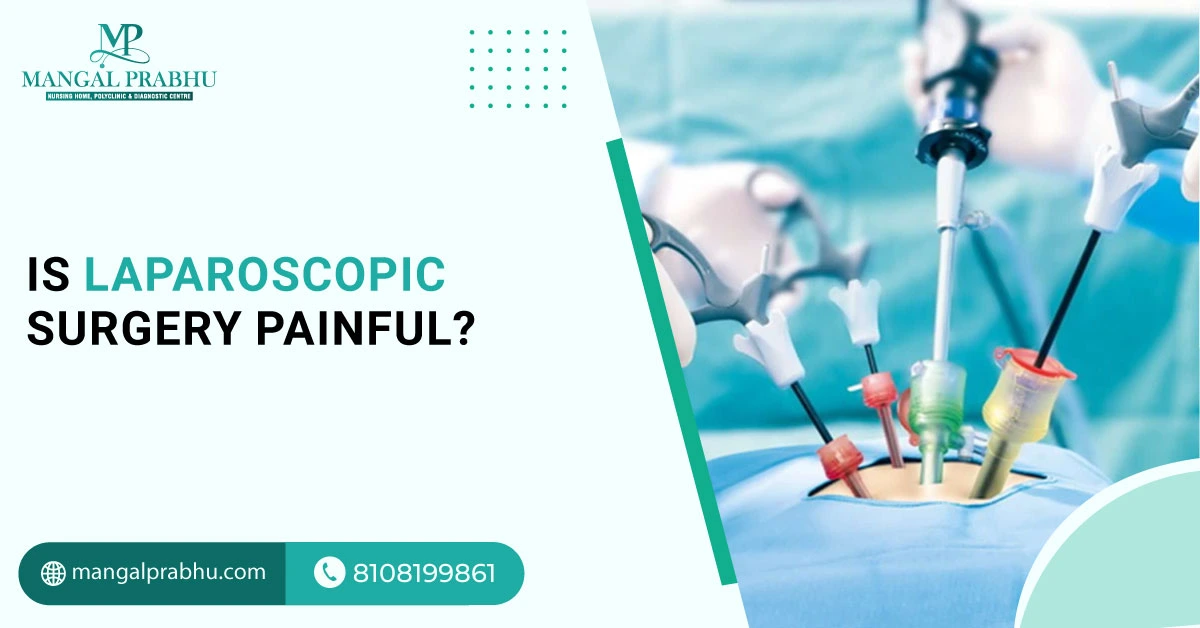
Is Laparoscopic Surgery Painful?
There’s an increasing demand for laparoscopic surgery in Navi Mumbai lately. The reason is its minimally invasive nature. With smaller incisions, it’s obvious that the recovery period will be much shorter than that in traditional surgery.
It’s performed as a diagnostic procedure (to look into your stomach and the pelvic floor for a detailed image of your internal organs) or as a surgical procedure (to fix the underlying issue). A commonly asked question among women undergoing laparoscopic surgery is, “Is the procedure painful?” Let’s find out.
Understanding Laparoscopic Surgery
The surgery is performed using a laparoscope, a rod-like tool with a camera at the end. The tool is inserted into your abdomen with a small cut, around half to one inch in length. The video camera attached to the laparoscope creates a clear picture of your internal organs on the monitor.
With real-time monitoring, the surgeon can move the laparoscope and execute the surgery precisely. The procedure is highly recommended when other non-invasive tests, such as ultrasounds, MRIs, blood tests, and CT scans, have failed to show accurate results. It’s also performed to collect tissues for biopsy.
Pain Levels During and After Surgery
You won’t feel anything during the surgery, as anesthesia (general or local) is used to numb the area. Despite being a minimally invasive procedure, laparoscopy can cause mild pain and discomfort after surgery. The pain can be managed with medication. Shoulder pain after surgery is also pretty normal.
It occurs because of the carbon dioxide used to inflate your belly to get a clear view of the organs. Apart from pain, you might notice bloating, which is another common side effect. It should resolve within a few days, though.
Here’s what affects your pain perception after laparoscopy:
- Your Pain Tolerance: Everyone has a different pain tolerance level. Some have the ability to cope with extreme pain, while others might not be able to handle mild pain. It varies from person to person.
- Surgery Type: Laparoscopy performed for a simple diagnostic procedure will be far less painful than the surgery for endometriosis, fibroid removal, and other complex surgical procedures.
- Surgeon’s Performance: Pain level after laparoscopy also depends on your surgeon’s performance. A qualified and experienced general surgeon in Navi Mumbai can execute the surgery without damaging the surrounding tissues. This can reduce postoperative pain.
- Psychological Triggers: Patients with anxiety, fear, stress, and other mental issues might have a lower threshold for pain than people who are calm.
Managing Pain Post-Surgery
Mild pain after laparoscopy is usually not a cause for concern. Here are a few tips you must follow to ensure less operative pain and faster recovery:
- Get adequate rest
- Eat nourishing foods and drink plenty of water
- Get pain medication
- Practice gentle movement and go for a walk every day to stay fit and prevent blood clotting.
Make sure you follow up with your surgeon for 2-3 weeks following the surgery. They will assess your incision site and overall health. See your doctor immediately if you have bleeding from the incision site, excessive pain that doesn’t respond to medication, fever, and other signs of infection.
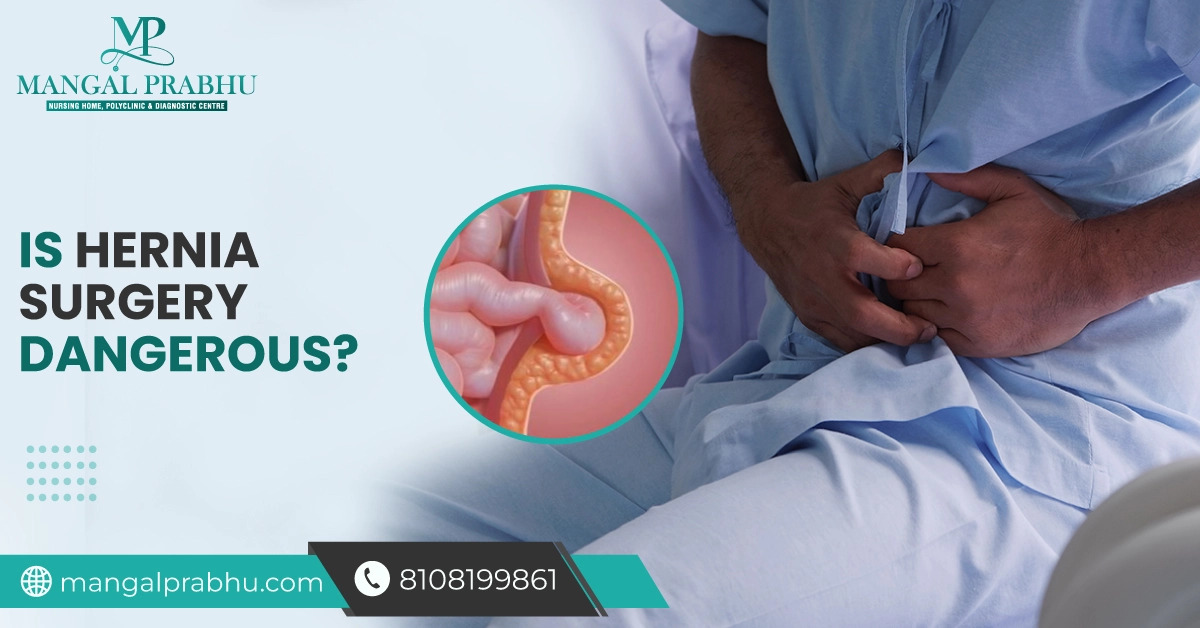
Is Hernia Surgery Dangerous?
What is Hernia Surgery?
Hernias is a condition where an organ or tissue pushes via a weakness in the muscle or connective tissue. Even though hernias can be helped with a change in lifestyle, the surgical remedy is occasionally important, mainly when it causes excessive aches and starts to intervene with everyday existence.
Types of Hernias and Their Risks
There is a huge style of hernia that includes femoral, inguinal, umbilical and hiatal hernias. Every individual of hernia has an excellent amount of danger. For instance, inguinal hernia are discovered greater in guys and might cause bowel obstruction if left untreated. On the other hand hiatal hernias can cause acid reflux and other issues in digestion. Nevertheless, the danger of hernia surgery depends on several factors: the form of hernia, the affected person’s fitness, and the surgical approach that is utilized in surgery. Mangal Prabhu Hospital provides treatment for hernia.
Safety Measures and Advances in Hernia Surgery
The improvement in scientific technology has stepped forward the protection of hernia surgery in the past few years, which has hindered the threat to an exquisite volume. Small and brief strategies consisting of laparoscopic and robot-assisted surgical operation have appreciably reduced the threat of headaches and feature also shortened the recovery time in contrast to conventional open surgical operation. Hernia Treatment in Navi Mumbai deals with sufferers with hernia and presents them with an efficient remedy. Moreover, Surgeons now have a higher right of entry to imaging generation and surgical instruments, permitting them to provide particular and powerful remedies for hernias.
Also Read: Symptoms Of Hernia In Male
Success Rates and Recovery Post-Surgery
In preferred, hernias surgical operation has an extra fee of success than failure; it facilitates in relieving the ache of patients and their symptoms and also reduces the chance of hernias recurrence. The restoration time after the surgical procedure varies depending on the sort of surgery executed and the character affected person. Still, usually, patients return every day for a few weeks after the surgical procedure. Patients must comply with the publish-surgery instructions like averting lifting heavy stuff and increasing bodily hobbies; following those can help and ensure great healing.
Common Concerns and Misconceptions about Hernia Surgery
Despite the good effectiveness of hernia surgery, there are nonetheless common things that should be handled and misconceptions approximately hernia surgical treatment. A large variety of people fear the hazard of infections, bleeding, or nerve damage, while others consider the possibility of recurrence of the hernia. These dangers are a gift with each surgical procedure. Still, they are distinctly low, especially while carried out by means of a professional healthcare professional, including a Hernia Surgeon in Navi Mumbai with a specialized clinical facility.
Conclusion
The conclusion is that common hernia surgical treatment is safe and effective to a notable degree for treating hernias and relieving pain and its various signs. The development in medical generation and surgical techniques is a major key that enables a lot in decreasing the danger involved in traditional open surgical treatment. By knowing the impact and protection measures and development in surgical procedures, patients need to make decisions about their treatment options; in case you are looking for a treatment option, then you definitely need to visit Mangal Prabhu Hospital as they provide a notable remedy.
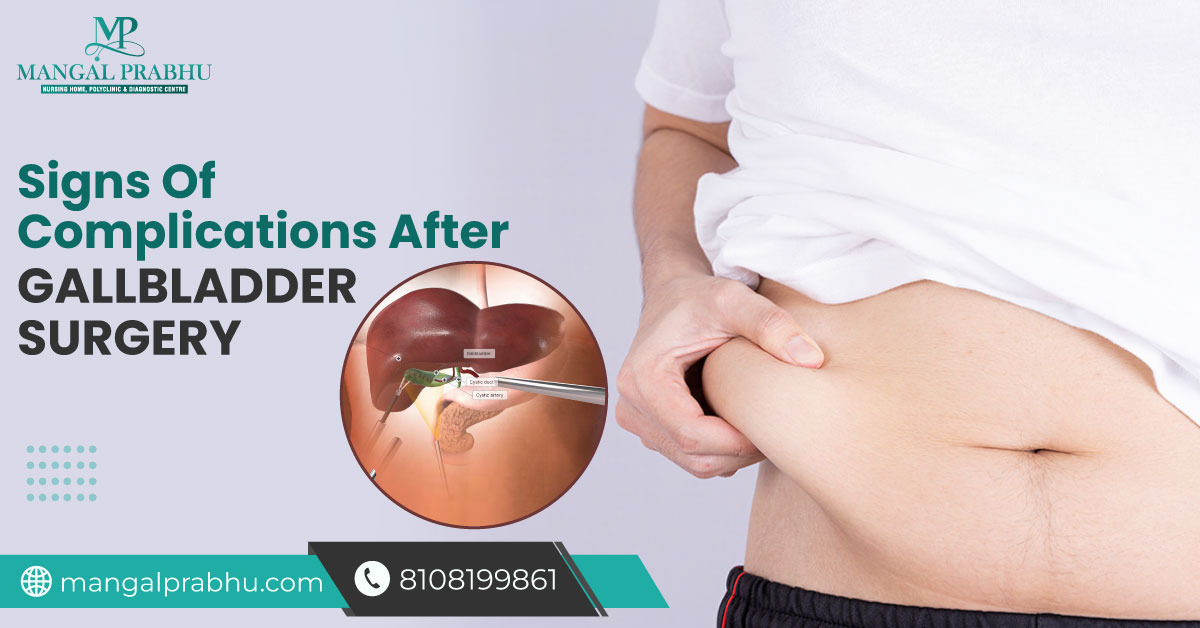
Signs Of Complications After Gallbladder Surgery
The best gallbladder surgeon in Navi Mumbai at Mangal Prabhu Hospital removes gallbladder from the body which helps in eliminating the pain associated with gallstones. Besides relieving the pain of gallstones, it also helps in reducing various issues. However, life without a gallbladder does not change much but sometimes it would be best for an individual to learn the signs of complications associated with this treatment.
As every surgical procedure has some risk, Gallbladder surgery may also lead to some common and severe complications. Thus, recognizing the signs of complications after this surgery is essential and helps in ensuring a smooth recovery and reducing unforeseen medical issues. Therefore, this guide provides a quick insight into common complications associated with post-gallbladder surgery.
Common complications after gallbladder surgery
Some common complications that individuals may encounter post-gallbladder surgery may include:
1) Infection
Postoperative convalescence can resemble a controlled construction site, yet the potential for infections persists. Indicators such as erythema, edema, and discomfort around the surgical site serve as sentinel manifestations of an unwarranted microbial intrusion demanding prompt attention.
2) Bile duct injury
Analogous to a backstage malfunction, inadvertent bile duct injury during surgery can result in symptoms of bile leakage, abdominal pain, and jaundice, signaling a deviation from the anticipated convalescence trajectory.
3) Bleeding
Though a certain degree of drama is inherent in any surgical procedure, excessive bleeding merits heightened attention. Increased pain, unexpected bruising, or feelings of weakness act as signals, warranting investigation into potential complications.
4) Bowel injury
The adjacent bowels, susceptible to sensitivity, may experience disruption during surgery, leading to abdominal discomfort and triggering internal alarms in rare instances.
Also Read: A Comprehensive Guide To Gallbladder Stone Removal
Signs of complications after gallbladder surgery
i) Fever and chills
An individual may experience increased body temperature, chills, and fever which may show signs of infection.
ii) Severe abdominal pain
Some people may experience intense and persistent abdominal pain which may indicate complications with bile duct injury or internal bleeding.
iii) Jaundice
The emergence of a yellowish tint in the skin and eyes suggests a noteworthy development. Jaundice indicates potential complications and mandates prompt medical attention.
iv) Persistent nausea and vomiting
While postoperative digestive adjustments are expected, persistent nausea and vomiting suggest lingering complications, potentially in the form of infection or bile leakage.
When to seek medical attention
a) Immediate medical attention
If you find yourself entangled in the dissonance of chest pain, abdominal discomfort, or the breathless whispers of difficulty breathing, don’t hesitate—rush to the virtuosos at Mangal Prabhu Hospital for unparalleled gall bladder stones treatment in Navi Mumbai. Swift, emergency medical care isn’t just an option; it’s the overture to safeguarding your well-being and sidestepping potential risks.
b) Contacting the surgeon
If you find a hint of jaundice, fever, or unwelcome abdominal discomfort, then reach out to your surgeon. By consulting with your surgeon promptly, you can take immediate action, ensuring that any nuances in your recovery are met with expert precision.
Conclusion
As you navigate the post-gallbladder surgery landscape, being attuned to the signals your body sends is like having a backstage pass to your recovery. With a keen eye for signs of complications and prompt response, you can ensure better medical attention for a successful postoperative journey.
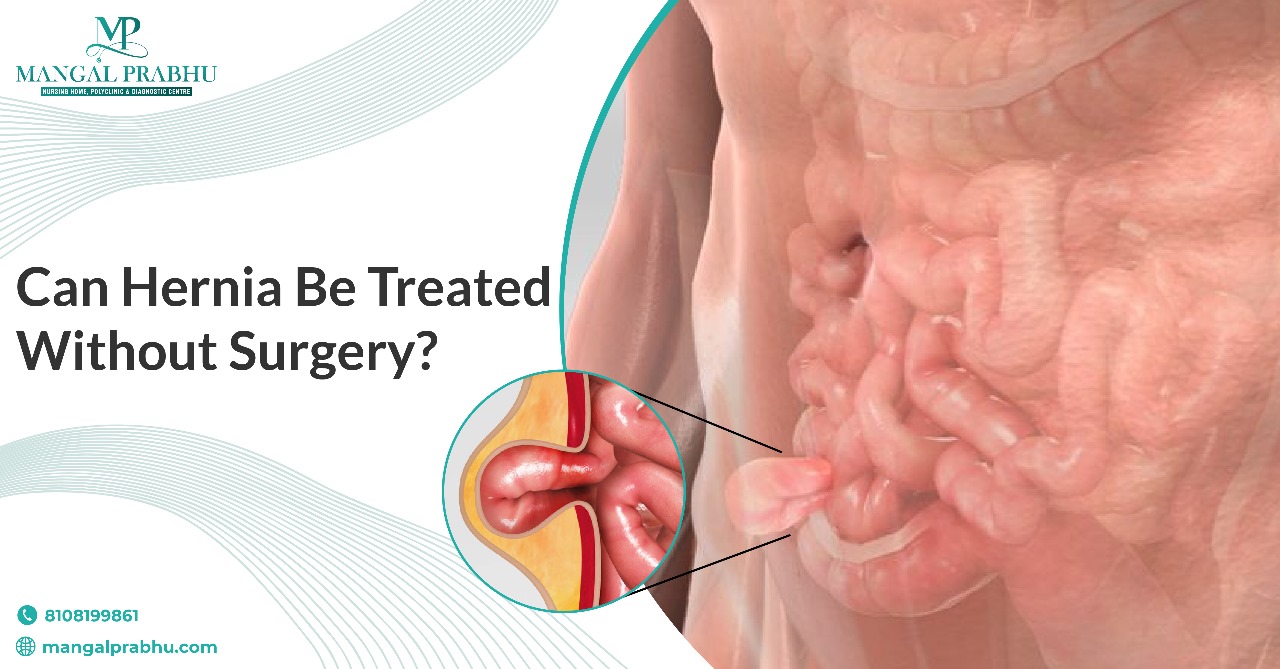
Can Hernia Be Treated Without Surgery?
A hernia is an unusual bulge caused by the organs that push through the weak muscle walls. The bulge is visible when you cough, sneeze, or put any kind of pressure on the affected area. Hernia can occur in the groin area, on your abdomen, and other parts of the body. They can be a birth defect or occur as you age. Hernias are also common in people who have undergone major surgery. Fortunately, hernia treatment in Navi Mumbai is available for those experiencing pain, discomfort, and other symptoms of hernia.
Non-Surgical Treatment Options
Unfortunately, the hernia will require surgery eventually. It doesn’t go away on its own. You can find temporary relief from certain medications, corsets that keep the bulge in place, and mild exercises, but these are only temporary solutions.
1) Medication:
Medication alone can’t help you get rid of a hernia, but it can relieve the symptoms and discomfort. For Hiatal hernia, you can take over-the-counter medication to relieve acid reflux and heartburn. Likewise, painkillers can help relieve pain.
2) Exercise:
If you practice high-intensity exercises or weightlifting, you might have to ask your healthcare provider if that’s safe. Any exercise that puts excess pressure on the bulge can make it worse. Talk to a hernia surgeon in Navi Mumbai and discuss the best exercises to prevent hernia from growing.
3) Dietary Changes:
Hiatal Hernias can cause GERD, heartburn, and many digestive issues. These are often triggered by certain foods that can cause your stomach acid to find its way to your throat. Take note of the foods that trigger these symptoms and focus on a healthy and balanced diet. Try to eat small and frequent meals.
4) Maintain a Healthy Weight:
Being overweight increases your risk of developing or worsening the existing hernia. It’s important to discuss your health goals with a healthcare provider and follow a weight-loss plan to shed those extra pounds.
Pros and Cons of Non-Surgical Treatments
As mentioned previously, hernia cannot be cured nor can it be reduced with manual treatments. You can take some steps to avoid the discomfort, pain, and other symptoms associated with the bulge, but you are eventually going to undergo surgery to have it fixed. The good news is a surgical procedure for hernia is minimally invasive and doesn’t take much time to heal.
You can also consider alternatives to open surgery, like robotic surgery or laparoscopic procedure. That said, not all types of hernias cause symptoms. There’s a chance the condition might go unnoticed and won’t require any repair either. It’s still best to consult your healthcare provider to ensure it won’t cause any complications. Let’s check out the pros and cons of non-surgical hernia treatments.
Advantages
- It can help reduce your hernia symptoms
- The non-invasive procedure doesn’t require any post-operative care
- You can carry out your routine activities
Disadvantages
- High risk of bowel obstruction
- Possibility of strangulation
- Hematoma
- Infections
See a healthcare specialist if you see the signs of hernia. Even if it’s causing any symptoms, it’s best to talk to a professional to rule out the possibility of any complications.
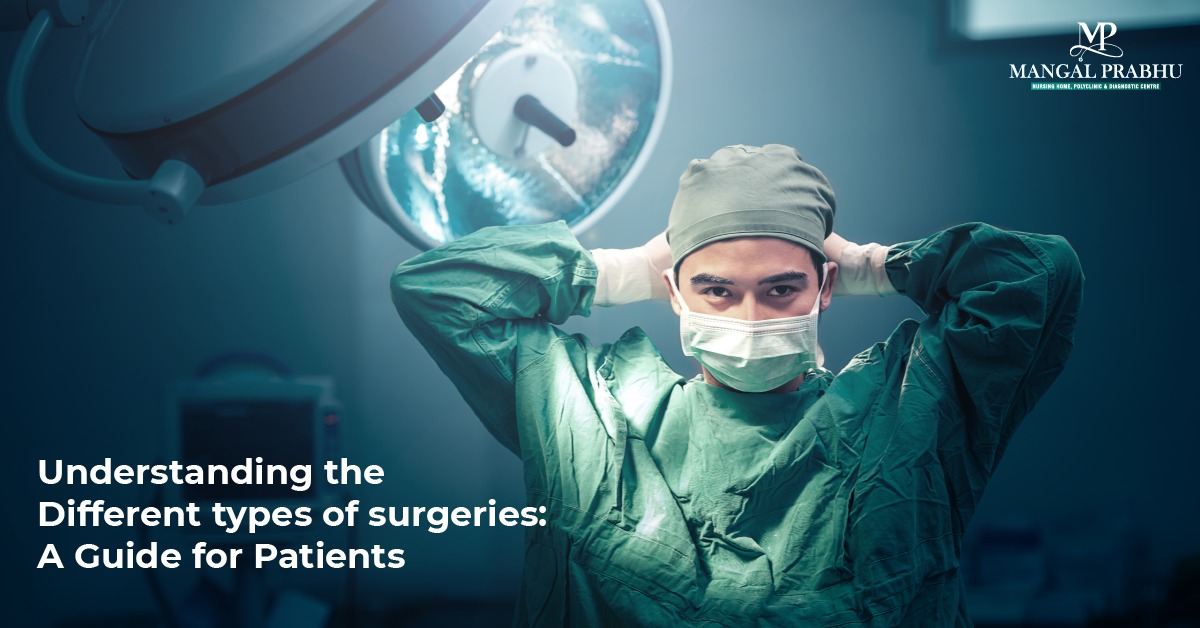
Understanding the Different Types of Surgeries: A Guide for Patients
With every different condition, there are also additional surgeries to eliminate the problem and improve the patient’s body’s functioning. It is classified in several ways, including location in the body, magnitude, and type of conditions such as oncologic, neurologic, orthopedic, etc. However, this guide will help you understand some of the most common surgical operations and know which surgery you need.
The Importance of Different Types of Surgeries
Every surgery has a different significance for a patient and is done for various reasons, which can be the following:
- Repair or remove damaged organs or tissues
- Transplant organ or tissue
- Redirecting blood vessels
- Improve physical appearance
- Eliminate an obstruction
- Implant electronic or mechanical devices
Types of Surgeries
Various types of surgeries vary according to the patient’s condition and complexity. However, here are some of the most common surgeries.
1. General Surgery
It is a surgical operation that concentrates on abdominal contents and the alimentary canal, such as the stomach, esophagus, large intestine, small intestine, appendix, pancreas, thyroid, gland, etc. General surgery also deals with soft tissue trauma, skin, breast, etc. Some examples of general surgery are hernia surgery, endocrine surgery, and appendectomy.
2. Orthopedic Surgery
It is a branch of surgery that deals with musculoskeletal conditions. It effectively treats sports injuries, infections, spine disorders, conventional disorders, etc. bone tumor surgery, joint reconstruction, rheumatoid surgery, and sports surgery are some examples of orthopedic surgery.
3. Cardiothoracic Surgery
It is a surgical procedure that treats internal organs in the thoracic cavity. Cardiothoracic surgery usually treats issues with the lungs, heart, and other mediastinal or pleural structures. Cardiothoracic surgery, cardiac surgery, cardiovascular surgery, and congenital heart surgery are some examples of cardiothoracic surgery.
4. Neurosurgery
It is a field of medicine that deals with the surgical operation of the nervous system. It primarily treats issues related to the spinal cord, brain, and nerves. Traumatology, neuro-oncology, pediatric neurosurgery, spinal surgery, and skull-base surgery are some of the most common examples of neurosurgery.
Procedures for Each Type of Surgery
As every issue requires a different type of surgery, the procedure for each surgical operation also differs.
General Surgery Procedures:
The general surgery procedure includes preparation, tests, recovery, after-surgery pain management, and discharge planning. However, you can get the following common practice of a general surgeon in Navi Mumbai in Mangal Prabhu Hospital.
- Appendectomy
- Gallbladder Removal
- Hernia Repair
Orthopedic Surgery Procedures:
The orthopedic surgeon works on the following diagnosis and procedures for orthopedic surgery.
- Joint Replacement
- Spine Surgery
- Arthroscopy
Cardiothoracic Surgery Procedures:
Cardiac surgeons and cardiologists work well together to treat different cardiological issues. However, a cardiac surgeon may offer some common surgical services and procedures.
- Heart Bypass Surgery
- Heart Valve Replacement
- Lung Surgery
Neurosurgery Procedures:
Neurologists use advanced tools and technologies and offer the following procedures and services to treat neurological conditions.
- Brain Tumor Removal
- Spinal Cord Surgery
- Deep Brain Stimulation
Conclusion
If you are also looking for the best place to do your surgery without any severe complications, you must consider Mangal Prabhu Hospital. It is a prominent multispeciality hospital In Navi Mumbai that offers various treatment plans, surgeries, and the best medication.

Do I Need Surgery for Hernia?
A hernia occurs when your muscles break down and the surrounding organs or tissues swell, forming a bulge. This bulge can be pushed back inward when pressed. Sadly, the hernia grows bigger and bigger and might require surgery to prevent complications.
However, not every type of hernia requires medical intervention. If you don’t notice any symptoms, you don’t need hernia treatment in Navi Mumbai. If you are considering surgery, the doctor will push the protruding organ back in its place and secure it with a mesh. The question is, “how do you know if you need surgery for a hernia?”
Hernia Surgery: Here’s When You Need It
A hernia doesn’t always require surgery, especially if it’s small and painless. But, if one of the following happens, medical intervention might be needed.
- Your organ or the tissue gets stuck in the abdominal wall, which might result in the complete cut of blood supply to the tissue.
- You have a strangulated hernia in which your organs do not get an adequate supply. If that happens, the organ might die immediately. This is a medical emergency, and surgical intervention is required. Visit your doctor immediately if you notice the hernia turning black or purple. Or if it’s accompanied by symptoms like fever and nausea.
- You experience extreme pain or any form of discomfort. Or the hernia grows larger.
Surgery is optional, or you don’t need it at least immediately if:
- You have a reducible hernia, which means it can be pushed back when you are lying down.
- It is almost invisible and doesn’t produce any symptoms.
Even if you don’t get surgery, follow-up appointments with your doctor are important if you are diagnosed with a hernia. You should at least have it checked every six months. Most adults and kids with hernia get an operation, though. It’s the most reliable way to ensure the hernia doesn’t cause any complications in the future.
Risks of Surgery
Hernia surgery is safe and is quite common among adults and kids. But like other operations, hernia surgery carries the risk of some complications, like:
- Infection in the treated area
- Blood clots (make sure you walk and keep your body moving to prevent blood clots after surgery)
- Some patients might develop chronic pain that lasts after surgery.
- Hernia might recur (putting mesh reduces the risk of the hernia returning by only half)
Alternative to Surgery
If you are too old to get surgery or are ill, you can talk to your doctor to discuss alternative treatments. Unfortunately, surgical treatment is the only option for an inguinal hernia. Some antibiotics might help reduce pain or push the bulge inward, but eventually, you might need to visit the surgery hospital in Navi Mumbai for permanent relief.
Your healthcare provider might recommend you wear a truss or a binder. These garments push the hernia back into its place by applying gentle pressure. These options come in handy when you can’t get a hernia surgery due to a preexisting medical condition or the risks of complications.
